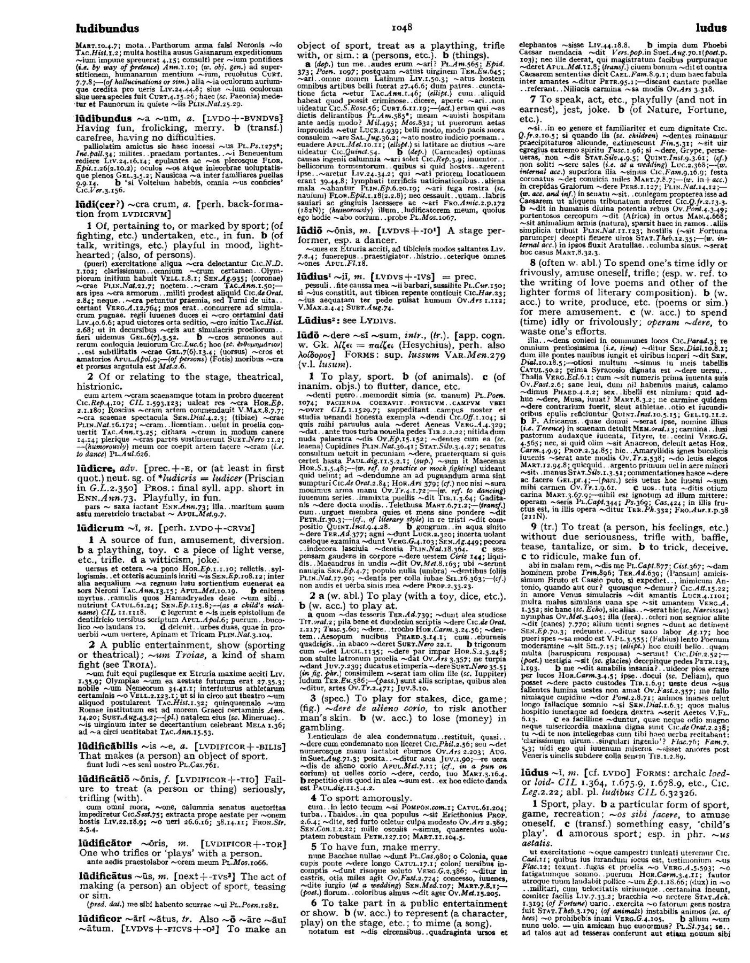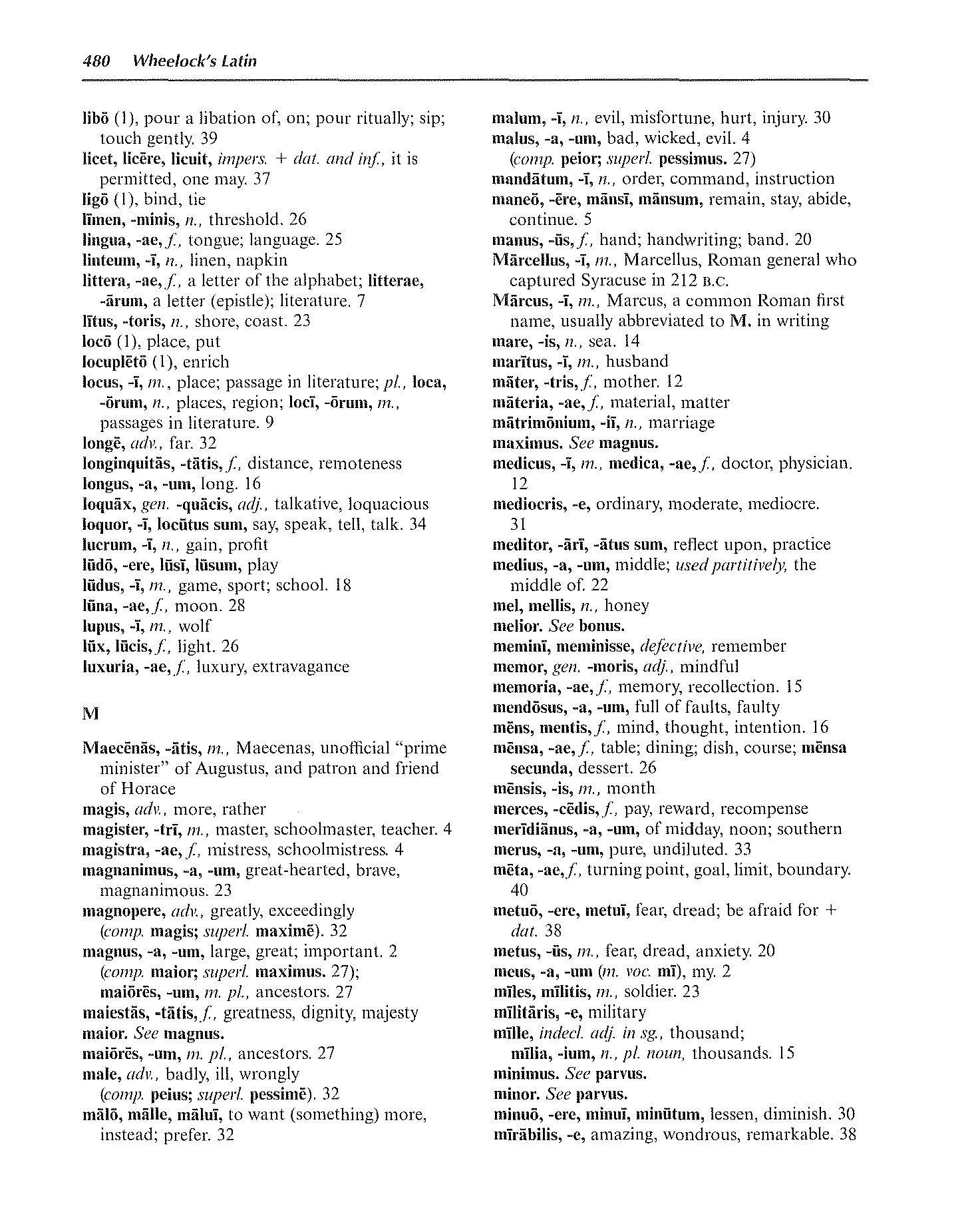
page_listing.tpl
page_subListingDetails.tpl
sub_listingDetails_style1.tpl
sub_listingDetails.title.tpl
lūdere to play
lūdere is a Latin Verb that primarily means to play.
Definitions for lūdere
Wheelock's Latin
Verb
- 1
play
Oxford Latin Dictionary
Verb
- 1
To play, sport. (b) (of animals). (c) (of inanim. objs.) To flutter, dance, etc.
- 2
(a) (w. abl.) To play (with a toy, dice, etc.). (b) (w. acc.) to play at.
- 3
(spec.) To play for stakes, dice, game; (fig.) ~dere de alieno corio, to risk another man's skin. (b) (w. acc.) to lose (money) in gambling.
- 4
To sport amorously.
- 5
To have fun, make merry.
Sentences with lūdere
Latin to English
Aestāte lūdēbant.Compare In the summer they used to play.
Quidam ludo is, quidam haud dubie insanio aio.Compare Some said that he was playing, some that he was without doubt mad.
Laetum in Parnasso inter pines tripudiantem in circulis ludere... atque taedis fulgere.Compare Joyous, on Parnassus, among the pines, leaping in a round, he plays... and glistens under the light of torches.
Conjugation table for lūdere
Cactus2000
| ACTIVE | |
| Indicative present | Indicative imperfect |
| lūdō lūdis lūdit lūdimus lūditis lūdunt | lūdēbam lūdēbās lūdēbat lūdēbāmus lūdēbātis lūdēbant |
| Indicative perfect | Indicative pluperfect |
| lūsī lūsistī lūsit lūsimus lūsistis lūsērunt / lūsēre | lūseram lūserās lūserat lūserāmus lūserātis lūserant |
| Indicative future | Indicative future perfect |
| lūdam lūdēs lūdet lūdēmus lūdētis lūdent | lūserō lūseris lūserit lūserimus lūseritis lūserint |
| Subjunctive present | Subjunctive imperfect |
| lūdam lūdās lūdat lūdāmus lūdātis lūdant | lūderem lūderēs lūderet lūderēmus lūderētis lūderent |
| Subjunctive perfect | Subjunctive pluperfect |
| lūserim lūseris lūserit lūserimus lūseritis lūserint | lūsissem lūsissēs lūsisset lūsissēmus lūsissētis lūsissent |
Infinitive present lūdere Infinitive perfect lūsisse Infinitive future lūsūrum esse | Imperative present lūde lūdite Imperative future lūditō lūditō lūditōte lūduntō |
| PASSIVE | |
| Indicative present | Indicative imperfect |
| lūdor lūderis lūditur lūdimur lūdiminī lūduntur | lūdēbar lūdēbāris / lūdēbāre lūdēbātur lūdēbāmur lūdēbāminī lūdēbantur |
| Indicative perfect | Indicative pluperfect |
| lūsus sum lūsus es lūsus est lūsī sumus lūsī estis lūsī sunt | lūsus eram lūsus erās lūsus erat lūsī erāmus lūsī erātis lūsī erant |
| Indicative future | Indicative future perfect |
| lūdar lūdēris / lūdēre lūdētur lūdēmur lūdēminī lūdentur | lūsus erō lūsus eris lūsus erit lūsī erimus lūsī eritis lūsī erunt |
| Subjunctive present | Subjunctive imperfect |
| lūdar lūdāris / lūdāre lūdātur lūdāmur lūdāminī lūdantur | lūderer lūderēris / lūderēre lūderētur lūderēmur lūderēminī lūderentur |
| Subjunctive perfect | Subjunctive pluperfect |
| lūsus sim lūsus sīs lūsus sit lūsī sīmus lūsī sītis lūsī sint | lūsus essem lūsus essēs lūsus esset lūsī essēmus lūsī essētis lūsī essent |
Infinitive present lūdī Infinitive perfect lūsum esse Infinitive future lūsum īrī | Imperative present lūdere lūdiminī Imperative future lūditor lūditor - lūduntor |
| PARTICIPLE | ||
| Participle present active | ||
| Nom. | lūdēns | lūdentēs |
| Gen. | lūdentis | lūdentium |
| Dat. | lūdentī | lūdentibus |
| Acc. | lūdentem | lūdentēs |
| Abl. | lūdente | lūdentibus |
| Participle future active | ||
| Nom. | lūsūrus | lūsūrī |
| Gen. | lūsūrī | lūsūrōrum |
| Dat. | lūsūrō | lūsūrīs |
| Acc. | lūsūrum | lūsūrōs |
| Abl. | lūsūrō | lūsūrīs |
| Participle perfect passive | ||
| Nom. | lūsus | lūsī |
| Gen. | lūsī | lūsōrum |
| Dat. | lūsō | lūsīs |
| Acc. | lūsum | lūsōs |
| Abl. | lūsō | lūsīs |
| Gerundive | ||
| Nom. | lūdendus | lūdendī |
| Gen. | lūdendī | lūdendōrum |
| Dat. | lūdendō | lūdendīs |
| Acc. | lūdendum | lūdendōs |
| Abl. | lūdendō | lūdendīs |
| Gerund | Supine | |
| Nom. | lūdere | lūsum |
| Gen. | lūdendī | lūsū |
| Dat. | lūdendō | |
| Acc. | lūdendum | |
| Abl. | lūdendō | |
Data sources
Notes
- Definitions
- Frederick M. Wheelock, Wheelock's Latin, 6th ed., rev. Richard A. LaFleur (New York, NY: HarperCollins Publishers, 2005): 480.
- P. G. W. Glare, Oxford Latin Dictionary, Vols. 1-8 (Oxford: Clarendon Press, 1982): 1048.
- Word frequencies
- Paul B. Diederich, The Frequency of Latin Words and Their Endings, PhD diss., (Columbia University, 1939).
- Louis Delatte, Suzanne Govaerts, Joseph Denooz, and Etienne Evrard, Dictionnaire fréquentiel et index inverse de la langue latine [Frequency Dictionary and Inverse Index of the Latin Language] (Liège, Belgium: Laboratoire d'analyse statistique des langues anciennes de l'Université de Liège [L.A.S.L.A.], 1981): 119-219.
Bibliography
Allen, Joseph H. Allen and Greenough's New Latin Grammar for Schools and Colleges: Founded on Comparative Grammar. Edited by James B. Greenough, George L. Kittredge, Albert A. Howard, and Benjamin L. D'Ooge. Boston, MA: Ginn & Company, 1903.
Crystal, David. A Dictionary of Linguistics and Phonetics. 6th ed. Oxford, UK: Blackwell Publishing, 2008.
Delatte, Louis, Suzanne Govaerts, Joseph Denooz, and Etienne Evrard. Dictionnaire fréquentiel et index inverse de la langue latine [Frequency Dictionary and Inverse Index of the Latin Language]. Liège, Belgium: Laboratoire d'analyse statistique des langues anciennes de l'Université de Liège (L.A.S.L.A.), 1981.
Diederich, Paul B. The Frequency of Latin Words and Their Endings. PhD diss., Columbia University, 1939.
Francese, Christopher. "Latin Core Vocabulary." Dickinson College Commentaries. Last modified 2014. http://dcc.dickinson.edu/latin-vocabulary-list.
Gildersleeve, Basil L., and Gonzales Lodge. Gildersleeve's Latin Grammar: Third Edition, Revised, and Enlarged. 3rd ed. London, England: Macmillan and Co., 1903.
Glare, Peter G.W. Oxford Latin Dictionary. Vols. 1-8. Oxford, England: Clarendon Press, 1982.
Krüger, Bernd. "Latin Conjugation Tables." Cactus2000. Accessed May 5, 2023. https://latin.cactus2000.de/index.en.php.
Pierson, Nick. "Sound of Text." Accessed October 26, 2019. https://soundoftext.com.
Wheelock, Frederick M. Wheelock's Latin. 6th ed. Revised by Richard A. LaFleur. New York, NY: HarperCollins Publishers, 2005.
Wiktionary Contributors. "Victionarium." Wikimedia Foundation, Inc. Updated March 18, 2019. https://la.wiktionary.org/wiki/Victionarium:Pagina_prima.
Citation
Chicago (17th ed.)
Allo Contributors. "lūdō, lūdere, lūsī, lūsum (v.) - Latin Word Definition." Allo Latin Dictionary. Last modified . Accessed February 19, 2026. http://ancientlanguages.org/latin/dictionary/ludo-ludere-lusi-lusum.
Entry created on . Last updated on .







